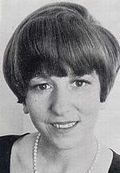An Interview with Mrs. Lore Parker(1)
Lore Parker
Doyle Dane Bernbach Inc. Vice President, Copy Supervisor
chuukyuu What motivated you to pursue this career? What made you determine to become a copywriter?
 Mrs. Parker At 5 I thought I wanted to be a fairy tale writer like the Brothers Grimm or Hans Christian Andersen. At 15 I wanted to be a romantic poet. At 20 I realized that, if I wanted to be a writer by profession, it had better be somewhere where I could make a steady income. So I thought I'd become a newspaper reporter.
Mrs. Parker At 5 I thought I wanted to be a fairy tale writer like the Brothers Grimm or Hans Christian Andersen. At 15 I wanted to be a romantic poet. At 20 I realized that, if I wanted to be a writer by profession, it had better be somewhere where I could make a steady income. So I thought I'd become a newspaper reporter.
When I was ready to take a job, I had learned shorthand and typing, and I thought the best way to get into a firn where I could eventually write would be to apply a sasecretary.
I had the choice of two jobs. One was with the New York Times, and one was with an advertising agem;y. The New York Times salary was $5 a week less than the salary at the advertising agency. And that is how I became an advertising copywriter rather than a newspaper reporter.
chuukyuu Why did you select DDB to join? What kind of letter did you write to Mr. Bernbach? What was his answer.
Mrs. Parker That first secretarial job was not at Doyle Dane Bernbach. But at that time DDB was just beginning to be talked about as the hot young agency. So I wrote a letter, not to Mr. Bernbach but to Mrs. Phyllis Robinson who was the Copy Chief at that time, and I simply told her why I wanted to work for Doyle Dane Bernbach.
And it seems that she and Bill Bernbach considered the letter a good enough piece of copy to hire me on the strength of the letter alone. I had no other samples to show.
So, if you were to ask me which has been the most successful headline I ever wrote, I might say it was "Dear Mrs. Robinson."
chuukyuu How did DDB help you in the skill of copywriter? I heard that you had no previous oopywriling experience.
Mrs. Parker I was lucky. When I first came to DDB, Bill Bernbach and Phyllis Robinson and Bob Gage were still doing all the major campaigns and concepts themselves, and I could watch them work. The rest of us did the smaller accounts, plus trade ads and catalogs and things like that. My big thrill was to be allowed to write body copy for Cole Swimsuit ads done by Phyllis and Bob.
Then an unknown new art director came called Helmut Krone, and he and I were given Barton's Candy all on our own. We did some newspaper ads that became "classics", and things went well from then on.
delicious---
wasn't it?
I was lucky because I had a chance to closely observe these outstanding people at work. And because my first, inexpert concepts and copy were supervised and edited personally by people like Bill and Phyllis. Today, a starting writer does not have that opportunity, of course. We arc several generations removed from those original giants.
chuukyuu I heard you were raised in England, but weren't you confused by the difference between British English and American English when you were writing copy?
Mrs. Parker Not confused. But in the beginning I was very annoyed at what I felt was sloppy, incorrect English used in this country. You see, in England I had lived in thc home of two English teachers and had been brought up to usc very correct King's English.
Something like "Winston tastes good like a cigarette should" ... well, it physicallhurt me to hear a gramatically wrong expression like that. The correct way, of course, would be "Winston tastes good as a cigarette should." (Although by now, in 1969, the "like" has passed into the language and is used even by educated people.)
Well, it soon became clear to me in those early days that I wouldn't be able, to change America's way of speaking---so I would have to change mine. And once I accepted that, I think I went overboard in trying to write colloquial American English, and now I'm completely at home in it.
What helped to Americanize my speech and writing was that I got laughed at a lot in those days for my very strong British accent and my British expressions which seemed pedantic to Americans. So I tried very hard to lose my British accent. Americans today say they can still detect the British accent in my speech---but when I visit my friends in England they say, "Oh my dear! You do have a terrible American accent." It seems I can't satisfy anyone! I do think the language problem is going to become less and less important, because British and American English are growing closer. The British have for many years now been adopting American slang, particularly through popular songs and recently the trend has been reversed. The Beatles and the whole mod culture of England have penetrated America. I think in another ten years there won't be too much difference in the way the young people speak in our two countries.
